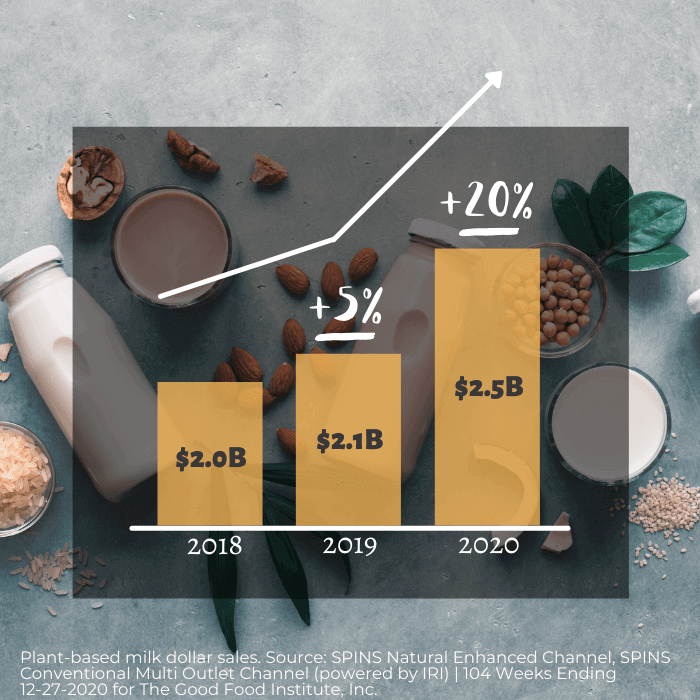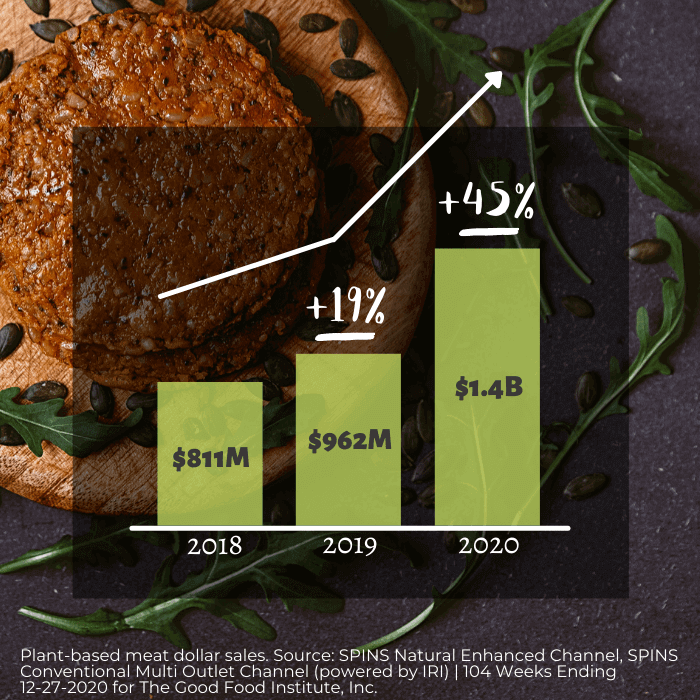Plant-Based Food Sales Outpaced Overall Food Sales in 2020

Sales Data Released by The Good Food Institute Shows Plant-Based Food Sales Are On The Rise
Recently released sales data report from The Good Food Institute and Plant Based Foods Association showed a significant increase in sales of plant-based products within the food industry in the past year. Plant-based foods sales grew 27 percent in 2020 and 43 percent over the past two years to reach $7 billion. The data collected demonstrates the market demand for plant-based foods and shows specific areas and categories within the market where there is an opportunity for growth.
In 2020, plant-based sales grew twice as fast as overall food sales. While there was greater expenditure due to the COVID-19 pandemic, the overall sales reports demonstrate that plant-based foods dominate the industry relative to animal-based foods. The categories that support the sales include (but are not limited to) plant-based meat, cheese, creamer, milk, yogurt, baked goods, and condiments.
PLANT-BASED MILK

The plant-based milk market is the most developed category within the plant-based sector, reaching a net worth of 2.5 billion dollars. After analyzing customer profiles, data showed that 39 percent of families purchased plant-based milk, and 75 percent of the purchases were categorized as 'repeat purchases.' This data suggests that while the plant-based milk sector experienced intense growth in recent years, it's a growth that is consistent and, based on the customer profile, not expected to decline. Within the plant-based milk category, almond milk was the leader, followed by oat milk and soy milk. In terms of product awareness and visibility, moving the plant-based milk to the refrigerator section of stores, where a customer would typically go to find dairy milk, was hugely successful in increasing sales.
"While dairy foods, including cow milk, are good sources of protein and nutrients, some plant-based milks cannot match the same nutrient profiles. For example, soy milk contains protein levels comparable to cow's milk, however, almond, and other plant-based milks have a lower protein content," notes Joe O'Neill, VP of Sales and Business Growth at A&B Ingredients.
"Our clients have seen impressive results adding further value to plant-based milk products by fortifying products with pea protein to raise the protein levels and increase the nutritional content. Not only do these protein-fortified milks have great taste and mouthfeel, but they also provide a balanced nutritional profile that meets the needs of today's health-conscious consumers. We see protein fortification as a way to add further value and as the next marketing and product development opportunity for plant-based milks," O'Neill mentions.
PLANT-BASED MEAT

The plant-based meat market is steadily growing and has increased more than 430 million dollars in sales in the past year. It is currently worth 1.4 billion and has grown 72 percent within two years. The top products driving growth include plant-based burgers, sausage links, and patties followed by nuggets, tenders, and cutlets. Meat analog products made up most of the plant-based meat category compared to non-analog products such as black bean burgers or veggie burgers. Whether a person chooses to consume plant-based food to improve their health, reduce their environmental impact, or for ethical reasons, meat analogs allow consumers to partake in an almost identical experience as eating meat.
Similar to plant-based milk, by refrigerating plant-based meat and casing it alongside traditional meat products instead of separating it into specialty areas, sales have exponentially increased. The marketing and merchandising strategies implemented in this category have helped increase both the product's visibility and accessibility. In many ways, plant-based meat is mirroring the growth of plant-based milk in prior years. If it follows similar trajectories, the market for plant-based meat can grow to 14 billion dollars.
When looking at customer profiles, we see that 18 percent of households in the U.S. purchased plant-based meat, and of that 18 percent, 63 percent were repeat-buyers. The frequency in which families are either incorporating plant-based meat into their diets or switching to plant-based meat completely demonstrates the market's potential for growth.
"Producing a plant-based ground meat product that replicates the sensorial characteristics of real meat can be challenging. But, the taste and texture of the plant-based meats are key to the continued growth of this category. In our experience, the combination of pea protein and pea fiber with textured pea and faba bean proteins allowed our customers to formulate plant-based meat analogs with similar eating characteristics to traditional ground meat. The new addition of textured faba bean proteins to the formulations not only tasted neutral but also improved the overall eating characteristics. The resulting plant-based burgers were juicy, chewy, flavorful, and satisfying," O'Neill explains.
"Beyond protein fortification and building texture in plant-based meat analogs, we also help our customers preserve the quality, and extend the shelf life of their products and keep that fresh flavor profile using natural flavors and plant-based antioxidants," Joe highlights.
PLANT-BASED DAIRY
Other plant-based dairy products, including ice cream, creamer, yogurt, butter, and cheese, also experience accelerated growth. The plant-based ice cream itself is worth 435 million dollars, and sales grew 16 percent in the past year alone. This is followed closely by plant-based creamer, selling over 98 million units in 2020 and growing 77 percent over the past two years. These trends are consistent throughout the category, revealing the consumer's interest in plant-based dairy substitutes. There has been an ongoing debate on whether dairy is advantageous or harmful in one's diet in recent years. While no definitive conclusions have been made, people who choose to consume fewer dairy products are able to maintain bone health by incorporating different calcium-rich foods into their diets.
"We have witnessed phenomenal growth in the plant-based creamers and understand the challenges in formulating coffee creamers with high-fat content. Creating the same creamy texture as traditional dairy creamer without fat separation is difficult when you are limited to plant-based ingredients. Our R&D team has found that pea protein outperforms other plant proteins with its excellent emulsification properties. This is an important attribute in formulating high fat plant-based creamers," O'Neill shares.
OTHER PLANT-BASED FOODS
While the plant-based meat, plant-based milk, and other plant-based dairy sectors are experiencing notable growth, there are still many areas that can grow. For example, the plant-based baked goods category has reached 152 million in sales yet has the potential for higher earnings. If, for example, stores sold them next to regular baked goods near the bakery area, instead of being separated into a different aisle, customers may be more likely to buy them. Marketing of these products is highly effective for the health-conscious consumer; using words that often coincide with plant-based products such as "clean, natural, and whole-food" may increase the likelihood of a customer opting for a plant-based brownie over a more traditional brownie.
PLANT-BASED FOOD MARKET SHOWED SUSTAINED GROWTH
The sales report showed remarkable growth within the plant-based market as a whole. The customer retention rate after buying plant-based products is exceptionally high, particularly within the plant-based milk and plant-based meat markets. Likewise, the customer profile for many plant-based products is promising, as families accustomed to buying and consuming these products will likely continue to buy plant-based alternatives in the future. In terms of food manufacturers and food formulators, the plant-based market shows excellent opportunity and reflects sustained growth.
How Can We Help?
We are here to help you with development of new and improved food products. Our technical service and sales teams can assist you in choosing the right ingredients best suited for your applications.
Product CatalogContact Us
